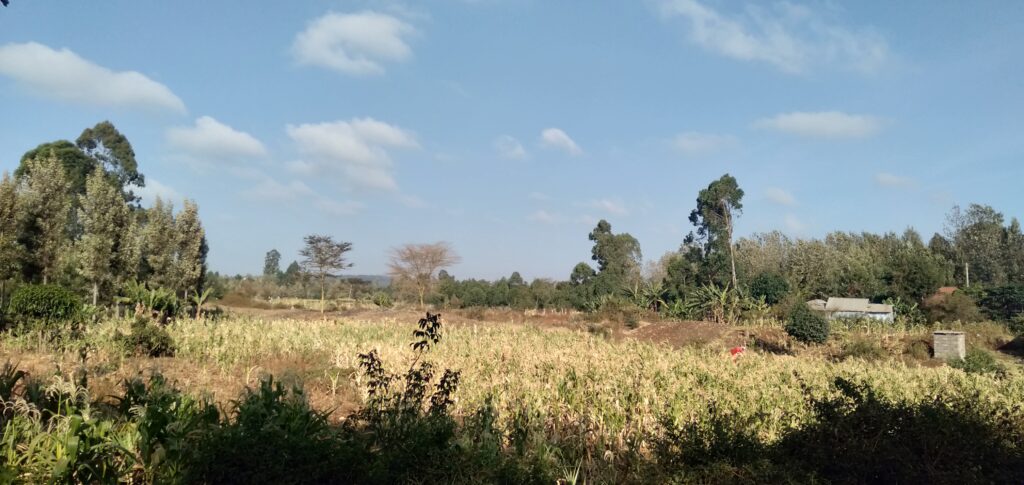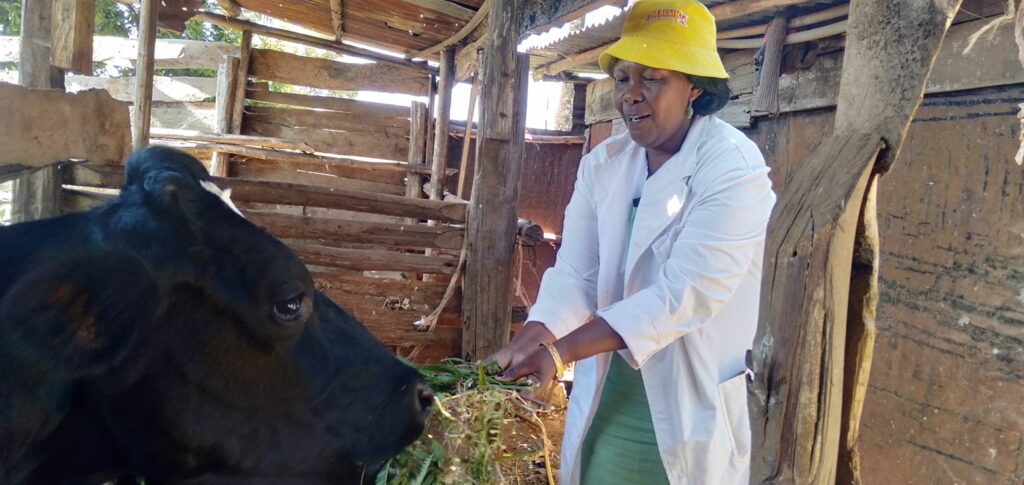African countries have continued to suffer the side-effects of climate change, even though the evidence suggests that they contribute a negligible part to global greenhouse emissions, as compared to other countries – about two three per cent.
Ghana has suffered the brunt of climate change effects with flooding leaving behind a devastating toll on communities across the country.
Most of the country’s poor population have suffered loss of life, the destruction of homes, livelihoods and infrastructure, leaving a devastating lasting effect on the nation.
Kenya has taken a step towards addressing these recurring problems just days after the U.S. government announced a new multi-billion-dollar initiative to bolster food supply systems in Africa.
The Kenyan government unveiled a new food security plan that aims to boost agricultural output in areas ravaged by drought.
Livestock Principal Secretary Harry Kimtai said he hopes the new plan will also help Kenya reduce its dependency on imported food.
While the Kenyan government should be commended for taking the initiative on food security issues, it’s not clear if the new plan will be strong enough to lessen the devastating impact that drought and subsequent food shortages have had on large swathes of the country brought on my years of climate-induced damage to the environment.
Josefa Leonel Correia Sacko, an economist from Angola and the African Union’s agricultural commissioner, said the twin issues of climate change and food security are now a continent-wide challenges that threaten to undermine Africa’s broader development goals.
The AU commissioner notes that temperature increases, heat waves, extensive flooding, tropical cyclones, prolonged droughts and sea level rise are resulting in loss of lives, property damage and population displacement. These effects hamper Africa’s ability to achieve its commitments to meet the Sustainable Development Goals (SDGs) and the African Union Agenda 2063.
This Agenda outlines Africa’s path for attaining inclusive and sustainable economic growth and development. Food security is the second UN SDG whose target is that by 2030, the world will be free of hunger.
Under AU 2063, food security appears as the fifth agenda under modern agriculture for increased productivity and production. With all the instabilities brought on by climate change, achieving food security for Africa becomes evasive. This goal may be nothing more than a mirage going by what Ambassador Sacko outlines.
And the effects are real.
On the outskirts of Nairobi in Dagoretti South, a smallholder farmer decries the problems of climate change.
Expensive farm inputs, high labour costs and the long wait for harvests that never come have become the norm for Simon Maina, who still tries to provide for his family off his small piece of land surrounded by informal settlements.
Such land is valuable ground for farmers specializing in growing vegetables that are in high demand in Nairobi. Simon, however, has not adopted any techniques that would help him make his land more productive.
The borehole on the property – a common feature in many homes in the area – is only used for household water consumption. Simon does no

t even grow backyard vegetables for his own kitchen.
“I do not know how to make this land more productive without the rains. What I have seen in other places is expensive to implement and I don’t have the money. Those who are making it in farming have big lands where they are even rearing animals. I don’t have the space, so I can’t afford to even use manure. Mostly I spend my money buying seeds and fertilizers but now it is become a loss-making adventure since for years I have not had a harvest. Farming is not sustainable here.”
“In the same neighbourhood, Cũcũ wa Maziwa, or ‘the milk granny’ as she is popularly known, has the same challenges but a very different outlook.
She has leased some land a few kilometers away from her home, where she grows food and fodder. She has converted the open space at her home into a vegetable garden with collard greens and kale that she sells to her neighbours throughout the year. She also grows tomatoes, carrots, and some indigenous vegetables.
She uses her well for irrigation and watering her cows, providing manure for her vegetable garden and the land she leases. An organic farmer well known for the quality of her farm produce, the milk granny lives a comfortable farm life on the income she makes.
Tens of kilometres away, Njeri Wa Njenga and her husband Njenga Ngigĩ, both in their nineties, have never needed government assistance for food.
But, Njeri, a former Mau Mau fighter, and Njenga, a former driver who remembers when Kenya was still largely virgin land with abundant food, are despairing of the increasing hunger they have witnessed in Kenya’s rural communities over the course of their 90+ years.
Njeri says it is now common for people to rely on government food aid.
Why Africa is food insecure?
The legacy of colonialism, poverty, inadequate infrastructure, political instability and climate change are largely to blame for the consistent food crises in Africa.
Colonial agricultural production systems took advantage of fertile land, water, and low labour costs to meet the export needs of Global North industries and consumers. This legacy has had a fundamental influence on hunger in Africa.
The colonial approach to dealing with matters agriculture and food security continue to this day.
For instance, Kenya has criminalized the sharing of seeds between farmers. In September 2022, smallholder farmers filed a court case challenging a 2012 punitive seed law that criminalized farmers selling and exchanging unregistered and uncertified seeds. Offenders face a prison sentence of up to two years in prison or a fine of up to Kshs. 1 million ($10,000).

Mary Gichuki, a conservation agriculture farmer in Kenya says that these policies and laws targeting smallholder farmers threaten food security since farmers are forced to abandon their practices.
“Banning sharing of seeds stops us from working with other farmers. We were filling the gap left by extension officers but now we just slowed down because of harassment by the government. This action by the government hits the most critical person who is able to produce food that can feed Kenya. The food crisis will only worsen,” she adds.
For Njeri, the increasing food insecurity problem is due to a lack of responsiveness from authorities to address communities’ real and shifting needs.
“Last year, the government announced that it was giving out subsidized fertilizers to farmers in the midst of a drought. It did not make sense to my neighbours and me. Instead of feeding people first, they were thinking of giving out fertilizers. The problem with the government is that it never consults. Most of their plans fail to work for us because of this,” she adds.
Non-governmental organisation Fridays for Future founder Issa Sessay says the needs of communities are often not considered by donor stakeholders, contributing to the frequent failure and abandonment of aid projects in Sierra Leone.
Ugandan teacher and climate sensitization activist Masika Ronah would agree, questioning how the mass rollout of mosquito nets is relevant to a family going hungry following consecutive years of drought. For her, sleeping hungry under a mosquito net is no different from having to deal with malaria. They are both deadly if left unattended.
As the increasingly extreme weather patterns that threaten farmers and food security across the continent gain momentum, aid efforts attempting to address the primary cause of food insecurity tend to fall short.
Globally, roughly one-third of food produced for human consumption is lost or wasted. In developing countries, most of which are in Africa, this is usually the fault of inadequate and inefficient storage infrastructure. With this, there are pest infestations and mould-ruined crops which leads to food waste.
Better access to adequate storage facilities could be essential in building food security and avoiding the waste of land, water, and energy resources.
For all these causes of hunger in Africa, political conflict is the primary driver of food scarcity. A recent African Centre for Strategic Studies report points out that more than 80% of Africans’ experiencing acute food insecurity are in conflict-affected areas.
Conflict displaces people from their homes, depletes their assets and access to resources, increasing the vulnerability of those already living in poverty, explains the Food and Agriculture Organization (FAO) of the United Nations (UN).
Political instability and conflict tend to trigger long-term food shortages that are exacerbated by disasters like droughts and flooding.
With the foregoing, food insecurity across Africa will continue to increase. The only way out is to implement strategies to improve Africa’s food security.
Investing in agriculture as per the Malabo declaration will help Africa have a better chance at improving food security even as climate change worsens.
Story & photos by Njenga Hakeenah
Credit:Source link




